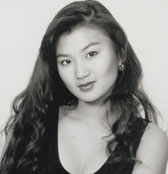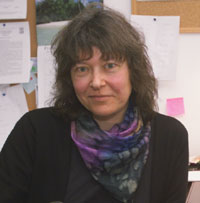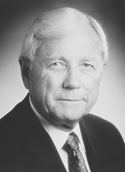|
 Army 1st lt. Lars Nadig (management '01) must have been tired of rolling through the desert in a tank with no name. Nadig, who commands a platoon of Bradley Fighting Vehicles--including the one he calls "The Fighting Gobbler" is currently stationed in Kuwait. Other Hokies who have been called to service in preparation for the possible war with Iraq include 11 students from the corps of cadets who have been deployed or alerted for active duty since November. Army 1st lt. Lars Nadig (management '01) must have been tired of rolling through the desert in a tank with no name. Nadig, who commands a platoon of Bradley Fighting Vehicles--including the one he calls "The Fighting Gobbler" is currently stationed in Kuwait. Other Hokies who have been called to service in preparation for the possible war with Iraq include 11 students from the corps of cadets who have been deployed or alerted for active duty since November.
A man of principle
Irving Jones Sr. (Ed.D. educational administration '99), the new executive director of secondary education for Richmond, Va., City Public Schools, has the sweetest gift an educator can possess--the ability to inspire and to lead by example. "Before we can teach our kids," Jones says, "we have to find ways to reach them." And find ways he does.
 In 1997, Jones, whose nickname is Sugarbear, was named the founding principal of Charlottesville, Va.'s new Monticello High School. A proactive leader who believes that "kids always come first, and all our activities should be geared toward them," Jones had hardly worn a path in the halls before the school had received full accreditation, the band program was up and running, a branch of the Air Force ROTC was in place, and student achievement on standardized testing had increased substantially in all subjects. In 1997, Jones, whose nickname is Sugarbear, was named the founding principal of Charlottesville, Va.'s new Monticello High School. A proactive leader who believes that "kids always come first, and all our activities should be geared toward them," Jones had hardly worn a path in the halls before the school had received full accreditation, the band program was up and running, a branch of the Air Force ROTC was in place, and student achievement on standardized testing had increased substantially in all subjects.
But perhaps Jones' most admired accomplishment was the launching of a unique teacher-student mentoring program that assured every student had an adult with whom to discuss school issues on a bi-weekly basis. Similarly well-received was an elective course for credit, "Student Leadership," in which students were assigned tasks around the school, including a required 40 hours of community service, though most logged thousands of hours.
Such industry and innovation didn't go unnoticed for long. Respected equally by administrators and teachers as by parents and students during his five-year tenure at Monticello, Jones was selected as the 2002 Virginia High School Principal of the Year by the Virginia Association of Secondary School Principals. He is the second Tech alumnus to receive the award: Louis Tonelson (Ed.D. educational administration '85) of Kempsville High School in Virginia Beach, Va., was last year's honoree.
As a result of his statewide honor, Jones was entered in the prestigious MetLife/National Association of Secondary School Principals (NASSP) competition that annually recognizes the nation's best secondary school principal. According to Gerald Tirozzi, executive director of NASSP, the judges who chose Jones as The 2003 High School Principal of the Year--the first from Virginia--over his finalist counterparts from Texas and Washington, D.C., were "overwhelmed" by his "record of accomplishment."
In light of his hands-on approach and knack for reaching students, it's academic that Richmond City Public Schools will soon be reaping the benefits of Jones' sweet touch.
Acting up
 Even though Michelle Krusiec (theatre arts '96, English '96) admits she has "auditioned for more Asian masseuse girls than any other role and they're all named Tai and they all know karate," the Asian-American actor continues to shatter outdated stereotypes. Even though Michelle Krusiec (theatre arts '96, English '96) admits she has "auditioned for more Asian masseuse girls than any other role and they're all named Tai and they all know karate," the Asian-American actor continues to shatter outdated stereotypes.
"I'm proud of the diversity of characters I've portrayed," she says, "for they have all been very different and not just of one genre. I've been able to do both comedy and drama in both TV and film."
A native of Virginia Beach, Va., Krusiec, who plays the role of Sachiko on the HBO series, "The Mind of the Married Man," still sees herself "as a Virginia girl who's in L.A."--but don't bet she'll fall prey to any Southern belle stereotypes, either.
Krusiec's first real gig was a role in the 1991 after-school special, "Sexual Considerations." Later, she hosted the Discovery Channel series, "Travelers," was a regular on the PBS series, "Mind on Science," played Sui on "One World," and has made guest appearances on "E.R.," "Providence," "Star Trek: Deep Space Nine," and "Titus."
Her first feature-length film was a role in "Nixon" (1995), whose director, Oliver Stone, she met when he lectured at Tech. And other roles have just kept coming, allowing Krusiec to pay her bills solely by her acting. Along with parts in "Popular" and "Pursuit of Happiness," Krusiec played a sorority sister in "Pumpkin" with Christina Ricci and recently appeared in "Sweet Home Alabama" with Reese Witherspoon. Krusiec began the new year in Atlanta filming "Dumb and Dumber II," in which she plays a nerd, a stretch for the studious actor who received a scholarship to Oxford after graduating from Tech.
But the work she's most proud of is her original one-woman show, "Made in Taiwan," a dark coming-of-age comedy about sex, dating, and a controlling, old-world mother that premiered at the HBO U.S. Comedy Arts Festival in Aspen in 2002. "The roles I've done are nothing in comparison to the story and journey I created for myself in my one-woman show," Krusiec notes. "It's a piece that has been opening many doors for me in Hollywood and has gained me the respect of many people in the business."
The seeds for the show, Krusiec says, were initially planted at Tech as part of a thesis in the honors program, and over the years, the piece has matured into an honest exploration of her relationship with her mother. A television pilot based on "Made in Taiwan" is in the planning stages, but Krusiec quickly adds that it's a "tedious process."
Not to worry, though, for this actor has more than enough patience to succeed in the business.
Model behavior
 Can computers help scientists get inside our heads? Eva Hudlicka (biochemistry '77), president of Psychometrix Associates Inc., thinks so. Can computers help scientists get inside our heads? Eva Hudlicka (biochemistry '77), president of Psychometrix Associates Inc., thinks so.
Psychometrix conducts research in cognitive science--an interdisciplinary field that attempts to study how the mind works--in an effort to better understand the decision-making process. To do this, Hudlicka builds computational models that simulate how different emotions and traits influence the way people make decisions.
She points out that she works with "stereotypes," such as an anxious or an aggressive individual, because "it is currently not within the state of the art of cognitive modeling to model and predict the behavior of a particular person---people are just too complex." The models represent the influences of states such as anxiety, anger, and personality traits, such as extraversion, emotional stability, or aggressiveness. Researchers can modify these parameters to create a model of a particular stereotype, then observe the distinct "behavior" exhibited in different scenarios.
One example of Psychometrix's work is a study just completed for the U.S. Army Research Institute in which computer-modeled commanders of differing personality types were placed in a peacekeeping scenario simulation. Other potential applications include training and simulation scenarios, games, and psychotherapeutic treatment environments.
Hudlicka's emotion-modeling work is a relatively new field. "There are currently no systems out there that can model as broad a set of effects of different emotions and personalities" in terms of manipulating the different parameters, she says. Recently, she submitted a proposal for modeling cultural differences, "a very similar idea to modeling individual differences [that] appears to be a very hot topic these days." She also plans to collaborate with Tech faculty members, particularly those who work in virtual reality and psychology.
Hudlicka holds master's and doctoral degrees in computer science (artificial intelligence) and earned a second master's degree in social work, "so I could do psychotherapy, which I find fascinating, but then I became busy in my current work in my 'old career'--computer science and artificial intelligence," she says, adding that she would love to go back and practice therapy at some point, at least part-time. "I've always had an interest in understanding 'how the mind works.' Many people do."
3-D technology re-creates the past and present
 As Michael Raphael (engineering science and mechanics '85) can testify, necessity is the mother of invention. While working on a project at an aerospace company in Baltimore, Raphael and his co-workers were designing in three dimensions without the tools to do so properly--because none existed. They ended up converting a medical implement into a 3-D modeling device that allowed them to measure accurately in x, y, and z space. Raphael was intrigued by the work and in 1995 formed Direct Dimensions, Inc. to provide engineering services using the device. As Michael Raphael (engineering science and mechanics '85) can testify, necessity is the mother of invention. While working on a project at an aerospace company in Baltimore, Raphael and his co-workers were designing in three dimensions without the tools to do so properly--because none existed. They ended up converting a medical implement into a 3-D modeling device that allowed them to measure accurately in x, y, and z space. Raphael was intrigued by the work and in 1995 formed Direct Dimensions, Inc. to provide engineering services using the device.
"The articulating arm looks like your arm, with a 'shoulder,' a 'wrist,' and an 'elbow,' " he explains. "It's very portable, generally four feet long, and you move it manually, like an arm. It knows where it is in 3-D space." A laser scanner attached to the end collects data from complex structures. That data can be used for reverse engineering--taking an existing object back to the "design" stage--and allows for fast, relatively inexpensive production of computer models.
"It's exciting work," Raphael says. "We get to do a lot of different types of projects." Currently, the company is working with the Israeli Navy to help keep its propellers in optimal shape. Direct Dimensions has also measured and analyzed a wide range of structures, from cars and airplanes to statues and monuments. But the modeling work is not limited to inanimate objects--the company also scans people, creating 3-D figures that can be used to make busts or even design a character in a video game.
Raphael is also involved in The Wright Experience's re-creation of Wilbur and Orville Wright's historic first flight (winter 2003 issue of Virginia Tech Magazine, page 24). Direct Dimensions has scanned propellers and smaller engine parts from the Wright Brothers' 1903-1911 planes. One project for which the company has received national attention is its work in scanning and measuring a large portion of the Lincoln Memorial, a project Raphael proposed to the U.S. Park Service a few years ago. Park service officials did not become interested until after Sept. 11, when they realized that no sufficient data existed that would allow them to rebuild the memorial if it were hit in a terrorist attack. With the data provided by Direct Dimensions, they now can construct an exact reproduction. "We hope it's never necessary to use this," Raphael says soberly, "but if it is, we have 'Abe' in our computer in full 3-D." For more information, go to http://www.directdimensions.com.
Former rector of BOV, Clifford Cutchins, dies
 Virginia Tech lost one of its most ardent and long-standing supporters when Clifford Cutchins III (accounting '44) died in December. Cutchins, a native of Southampton County, Va., was a member of the Virginia Tech class slated to graduate in 1944 but whose members were called to serve in World War II. After serving as a captain in the U.S. Army in the Pacific Theater, Cutchins returned to Virginia Tech to complete his degree. Upon his graduation, he began work as a bank teller in Franklin, Va., and rose through the ranks of the industry to become chairman and CEO of Sovran Financial Corporation (now part of Bank of America). Virginia Tech lost one of its most ardent and long-standing supporters when Clifford Cutchins III (accounting '44) died in December. Cutchins, a native of Southampton County, Va., was a member of the Virginia Tech class slated to graduate in 1944 but whose members were called to serve in World War II. After serving as a captain in the U.S. Army in the Pacific Theater, Cutchins returned to Virginia Tech to complete his degree. Upon his graduation, he began work as a bank teller in Franklin, Va., and rose through the ranks of the industry to become chairman and CEO of Sovran Financial Corporation (now part of Bank of America).
In addition to his business success, Cutchins was dedicated to serving his community and his alma mater. A member of the Virginia Tech Board of Visitors for a total of 14 years, including a term as rector, he also served on the steering committee for the last university-wide fundraising campaign, was a member of the board of the Virginia Tech Foundation, and was actively involved with the corps of cadets, the Pamplin College of Business, and the Campaign for the Virginia Tech Alumni Center, as well as many other areas of university life. Cutchins was a charter member of both the Ut Prosim Society and the newly created President's Circle, which recognizes donors who have given more than $1 million to Virginia Tech. In 1995, he received the William H. Ruffner Medal, the university's highest award for service.
"Cliff was a Virginia gentleman. Indeed, he was a Virginia treasure," says President Charles Steger. "He was a successful businessman, but so much more. A civic leader in his community across the state. A major benefactor to Virginia Tech and a trusted leader and advisor. He was a giant among the 'sons of VPI.'"
Alumnus dies in plane crash
B. Ralph Sylvia (electrical engineering '61) was among the 21 people killed on Jan. 9 when Air Midwest Flight 5481 crashed at the Charlotte-Douglas International Airport. Sylvia, a retired nuclear engineer who frequently traveled as a consultant, was a supporter of Virginia Tech, recently donating money to the construction of phase III of English Baseball Field. Sylvia leaves a wife and son.
|

